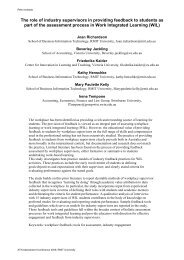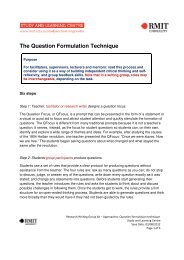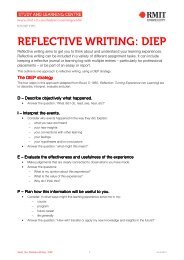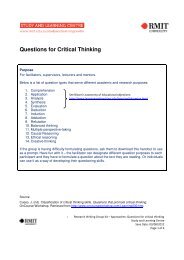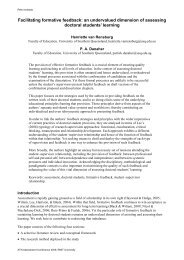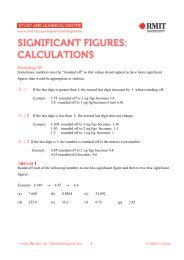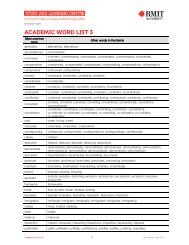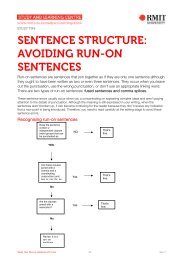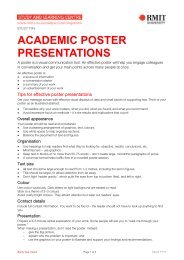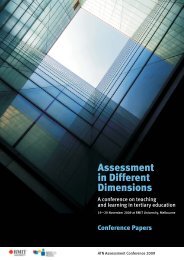student feedback and leadership - Office for Learning and Teaching
student feedback and leadership - Office for Learning and Teaching
student feedback and leadership - Office for Learning and Teaching
Create successful ePaper yourself
Turn your PDF publications into a flip-book with our unique Google optimized e-Paper software.
Part B: Building Leadership Capacity - BUS: School of Economics, Finance & Marketing ART Report<br />
What did course teams do to improve <strong>student</strong> <strong>feedback</strong> <strong>and</strong> why?<br />
Our project commenced in March 2007 with the initial stage involving the analysis<br />
<strong>and</strong> collection of data on <strong>student</strong> <strong>feedback</strong>. This activity was undertaken during<br />
both Semesters 1 <strong>and</strong> 2, 2007. In addition, course development initiatives<br />
were discussed <strong>and</strong> developed in relation to this <strong>feedback</strong> as well as the<br />
perceptions <strong>and</strong> experience of the teaching staff. The second stage focused<br />
on the implementation of these initiatives which was undertaken by one course<br />
(ECON1030 Business Statistics) in Semester 2, 2007 <strong>and</strong> all courses in Semester<br />
1, 2008. An evaluation of course developments was then undertaken <strong>and</strong> further<br />
refinements made <strong>for</strong> Semester 2, 2008. These activities will be discussed in the<br />
following sections.<br />
Stage 1: Analysis <strong>and</strong> Planning<br />
The first stage of the project involved data collection <strong>and</strong> analysis relating<br />
to <strong>student</strong> <strong>feedback</strong> as follows:<br />
––<br />
Each course coordinator undertook analysis of the qualitative <strong>feedback</strong> from<br />
the CES to identify both strengths <strong>and</strong> opportunities <strong>for</strong> improvement of the<br />
<strong>student</strong> experience. Key themes which emerged included the need <strong>for</strong><br />
improved physical learning environments, increased learning support<br />
from staff <strong>and</strong> more personalised <strong>feedback</strong> on progress.<br />
––<br />
A research assistant, under the supervision of our Director of Research,<br />
was enlisted to analyse quantitative CES data to determine key drivers<br />
of the <strong>student</strong> experience <strong>and</strong> in particular the Good <strong>Teaching</strong> Scale (GTS).<br />
The following CES items were found to have a positive correlation with the six<br />
GTS items:<br />
The course is well organised<br />
The course contributes to my confidence in tackling<br />
unfamiliar problems<br />
I feel I can actively participate in my class<br />
I can see how I’ll be able to use what I am learning in my career<br />
Overall, I am satisfied with the quality of this course<br />
Furthermore, on average, international <strong>student</strong>s gave a higher GTS rating<br />
than domestic <strong>student</strong>s <strong>and</strong> mature <strong>student</strong>s gave a higher GTS rating.<br />
– – All teaching staff associated with the Common Core (course coordinators,<br />
lecturers <strong>and</strong> tutors) were invited to attend a discussion <strong>for</strong>um to explore their<br />
views of the learning experience <strong>and</strong> add to the data by including in<strong>for</strong>mal<br />
<strong>feedback</strong> that teaching staff may have received. The discussion also<br />
highlighted the challenges of teaching a large class as well as sharing<br />
in<strong>for</strong>mation on the strengths of each course (what works) <strong>and</strong> what<br />
potential improvements could be made.<br />
Page 93



